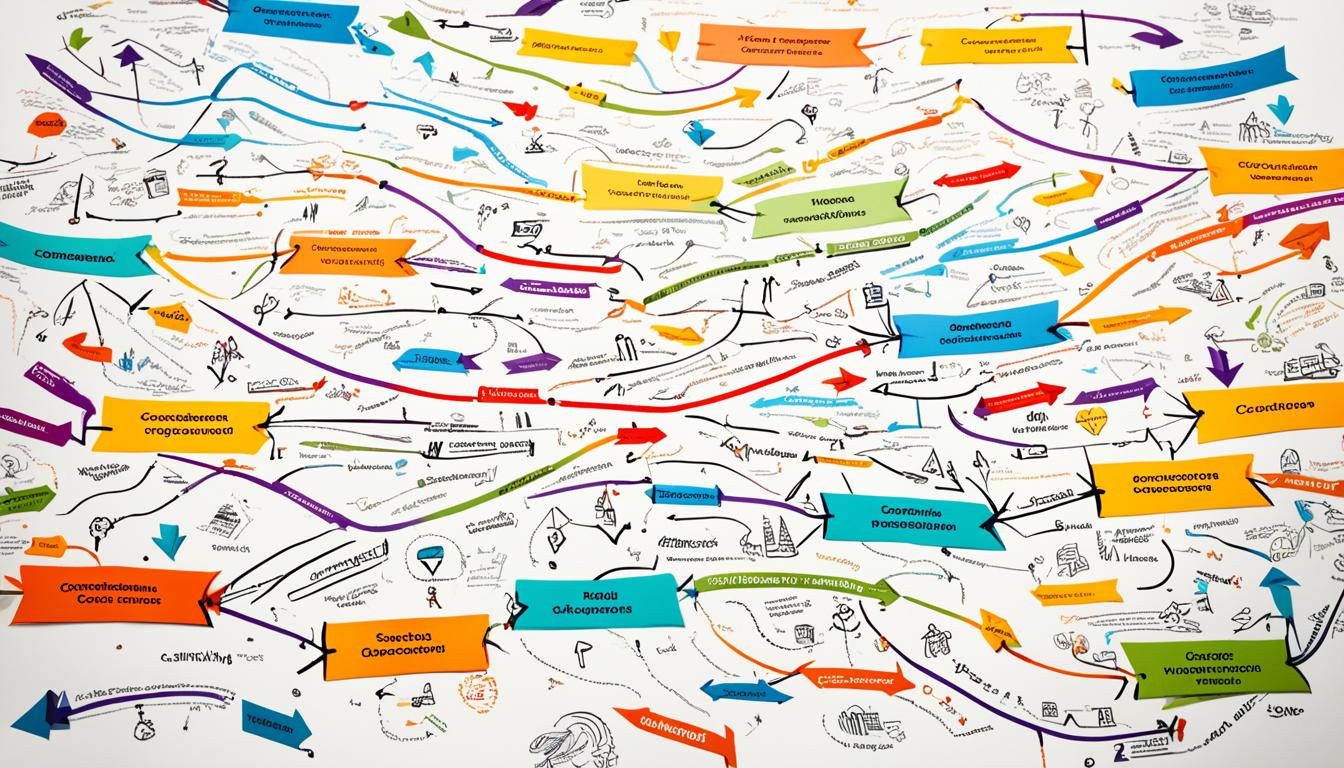Did you know that 70% of all jobs are not published? That’s right, most opportunities are found through who you know. This is true for freelancers too.
Key Takeaways
- Being part of a group helps you not feel alone.
- You can make friends who know about work.
- Groups help you learn and get advice.
- Getting to know more people can give you more job chances.
- Jobs can come from friends, not just job lists online.

Networking and community building are important for your success. They help you make professional connections. Connections mean people you know in work.
They also help in building relationships, which means making friends who can help you in your work. Good relationships can help you find jobs that are not on job sites.
That’s why social networking and being part of online communities are big deals.
When you work by yourself, you can feel alone. But if you join a group with other freelancers, you can get help and give help too.
It’s like having work friends online. You can learn from each other. You can get advice on your work. And you can find new jobs too.
So, let’s look at why making friends in business networking matters for you, a freelancer.
Networking and Community Building: A Lifeline for the Freelance Economy
Do you feel alone in your freelance work? You’re not the only one. Many freelancers face quiet days without coworkers. But here’s the good news – networks and communities can be your lifeline.
They keep the freelance economy buzzing. Networks help you meet others just like you. You can make friends, learn new things, and find work together.
It’s like joining a club where everyone wants to help each other. Let’s talk about how these groups can change the game for you.
Combatting Freelancer Isolation with Solidarity
Imagine having a tough day, and there’s nobody to talk to. Social networking sites, like Facebook, give you a place to share and listen.
You can chat with others who understand your day. They know the work you do and the challenges you face.
This solidarity, or teamwork, makes you feel good. It can turn a bad day into a better one.
From Competition to Collaboration
Sometimes freelancers see each other as rivals. But when we join a network, rivals can become teammates.
Teamwork means sharing tools, tips, and sometimes, even work!
This turns competition into something better. We call this collaboration. And it means you don’t have to do everything alone.
The Shared Knowledge of Freelance Communities
When you join a community, you find lots of smart people. Everyone knows something special.
Maybe someone is great at making websites. Another person could be a superstar at writing stories.
When they share what they know, everyone learns. It’s like going to school with friends who all teach each other cool tricks for work.
This way, everyone gets better at what they do.
| Networking Benefit | Why It’s Great |
|---|---|
| Making Friends | Friends can cheer you on and help you feel less lonely. |
| Trading Secrets | You learn new things that make work easier and better. |
| Finding Jobs | Your friends might know who needs help and can tell you about jobs. |
| Getting Help | When a job is tough, someone can always give you a hand. |
So, if you’ve been working by yourself, think about joining a network. It could be on Facebook, Slack, or any other place where freelancers meet.
Networks give you friends, work, and a way to share what you know. And that’s a big help for people like you who work on their own!
Mentorship and Support Systems in Freelancing
Mentorship opportunities are everywhere in the freelance world.
You might not see them at first, but they are part of community engagement and building relationships.
Imagine you’re at a coffee shop. You overhear someone share a tip on client communication or crafting contracts.
That’s how organic mentorship can start in freelance communities.
Networking and community building are about giving and taking. You get help and then, you can give help to others.
It’s like passing on a favorite book. You read it, learn from it, and then pass it on so someone else can enjoy it too.

Online courses, message boards, and Facebook groups are like big gatherings for freelancers.
They come to meet, learn, and grow. Think of these spaces as big classrooms without walls. Here, everyone can be both a student and a teacher.
As a freelancer, your growth often comes from the advice and stories shared in these spaces.
- Mentorship doesn’t have to mean formal one-on-one sessions. You can learn a lot from group discussions.
- In a community, you’ll find people who’ve been where you are now. They can guide you on what to do next.
- When you get help, remember it. One day, you can offer the same kind of support to someone new.
Freelance groups are also support systems. They’re places where you can talk about the ups and downs of working for yourself.
It’s about sharing, not just work but experiences and feelings too.
| Community Spaces | Benefits | How to Engage |
|---|---|---|
| Message Boards | Get quick tips and feedback | Post questions, share experiences |
| Facebook Groups | Connect with freelancers globally | Participate in discussions, offer help |
| Online Courses | Learn new skills, find mentors | Join courses, interact with members |
Remember, as you step into these groups, it’s about making friends and not just making contacts.
It’s about being a part of a community that grows together.
In these spaces, everyone shares the same goal: to build a successful freelance life.
Finding and Securing Freelance Opportunities Through Networks
As a freelancer, your success is often linked to who you know and how you connect with others.
Building your network can be like planting seeds. Some will sprout immediately, offering freelance opportunities, while others may take time to grow.
But each connection is a chance at new work. Imagine meeting someone at a networking event.
They might not need your services now, but when they do, your name could come to mind first because of that meeting.
Networking events can lead to many advantages. These events are where you share handshakes, smiles, and stories.
More than that, you share work. Let’s dig into why these connections can help you find the gigs you want.
The Role of Peer-to-Peer Referrals
Think about the last time you asked a friend to suggest a good movie. Finding work can be similar.
Your freelancer friends might know someone who needs your skills. And just like that, a referral is made.
Peer-to-peer referrals are powerful.
They come from trust and often skip the need for job ads. By helping each other out, freelancers can keep the workflow steady and support one another’s business.
Exclusive Gigs: The Hidden Job Market
There’s a whole world of freelance gigs that never hit the public job boards.
They live in the hidden job market. These are the jobs passed between professional connections.
To uncover these, you need to be active in your network. Share your skills and ask about the needs of others.
Taking part in discussions, both online and in person, can open doors to opportunities that you might never see advertised.
When you grow your network, finding work becomes easier. You become part of a community that looks out for each other.
And the bigger your network, the more opportunities can come your way.
Sometimes, the best opportunities are the ones that come through friends.
Remember to be that friend too. Share opportunities and your network will strengthen.
A strong network means a strong freelance career. Opportunities can come from where you least expect them.
So keep networking, sharing, and connecting.

Building a Sustainable Freelance Career with Strong Connections
When you work freelance, your network is like a safety net. It helps you to stay strong when work is up and down. People who know different things can give you new ideas. This makes you even better at your job.

Being in a group means you can learn from each other. If you need help or feel stuck, people are there for you.
Good connections can lead to new work, too. When you meet people, they might tell others about you. This can bring you more jobs.
By talking and helping in your network, you show you care.
Others will see you’re good to work with. So, you’ll make friends who want to help you for a long time. That helps your job to grow.
- Find networking opportunities that fit your work.
- Grow your network by meeting new people.
- Join in with your community. Help out and get to know others.
- Work on building relationships. Say hello, chat, and share about your work.
- Make professional connections. These are people you work with or who might need your work.
Remember, your network helps hold your job up. Keep talking to people and finding new friends. This helps your freelance career to stay good for a long time.
Conclusion
If you’re working for yourself, you know it can be a mix of fun and tough times.
But here’s a secret: you’re not alone. Other people are also freelancing, and they’re talking and helping each other.
This is networking and community building, and it’s like a super tool for your freelance career.
It helps you to not feel alone and can lead to finding more work.
When you make friends with other freelancers, it’s like growing a tree.
The more you water it with chats, help, and showing up at events, the bigger it gets. This tree can then give you sweet fruits, like tips on doing your job better and chances to work on cool projects.
To make this magic happen, you should jump into talks with others, use websites where lots of people go, and be nice to everyone you meet.
It takes time to build good friendships, just like it takes time to be great at your job.
But the good news is, as your circle gets bigger, so do your chances to do more in your career.
Keep meeting people and sharing your smarts and heart. This is how you make sure you have a strong, fun, and successful freelance life.
Keeping in touch with your new friends in freelancing is a must-do!



